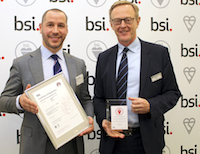 Kyocera's acquisition of Annodata extends the capabilities of both companies in a deal that also ensures the Herts-based managed services provider retains strategic and operational independence, explains Annodata's co-founder Andrew Harman.
Kyocera's acquisition of Annodata extends the capabilities of both companies in a deal that also ensures the Herts-based managed services provider retains strategic and operational independence, explains Annodata's co-founder Andrew Harman.
Established almost 30 years ago by Andrew and Tim Harman, Annodata has become one of the UK's biggest providers of managed print services with an impressive list of blue chip clients and partnerships with some of the largest vendors in the industry. According to Harman, the time had come to take the business into the next phase of development. "Kyocera's investment and expertise will enable us to continue our growth trajectory," he said. "This will bring new opportunities for staff for career progression, and for clients who will benefit from being part of a larger organisation."
Annodata's revenues currently stand at over £70 million, up from £57.3 million in July 2014, and the employee headcount currently stands at over 340 which has almost doubled in the last few years. Profitability has also seen healthy increases, up by over 91 per cent during the past four years due in part to Annodata's focus on high value managed services. This increase in profitability has secured the company 24th position in The Sunday Times BDO Profit Track 100 2016, one of only a handful of IT services companies to have made the grade.
Annodata has worked with Kyocera for a number of years but what tipped the balance in terms of selling was that the acquisition would allow the firm to continue independently while gaining access to the additional resources of Kyocera Corporation. "We had interest from a number of different organisations ranging from venture capital firms through to trade buyers, but it was vitally important to us that we chose a company that continued and upheld Annodata's legacy," explained Harman. "With Kyocera's investment we believe that we are well positioned to capitalise on market trends and grow our business further."
Annodata will operate as a separate business entity to Kyocera Document Solutions UK, with its own independent strategy and management team. "Our independence is important to us, and also to Kyocera, so that won't change," confirmed Harman. "Annodata's management team has a wealth of experience dealing directly with customers in almost every vertical, both here in the UK and also on a global basis. Remember, although our organisation is solely UK-based, we support and deliver services across Europe, EMEA and ASIA. That comes as a huge benefit to Kyocera and supports its proposition well."
The acquisition has been well received by staff, although it did come as a surprise to some, noted Harman. "Nonetheless, it comes as a good piece of news as it puts us in a stronger position against our competitors and allows us to drive investment in further training and developing our staff," he added. "There are absolutely no plans to reduce the number of Annodata employees as a part of this transaction and we're currently recruiting in excess of 18 new members of staff. Our customers and our people will be the top priorities for Annodata post-acquisition. Without them, what do we have?"
There will be no changes to the leadership team, confirmed Harman. Rod Tonna-Barthet will continue as CEO working alongside the wider management team. As well as this, Harman and his brother Tim will also continue to guide and support the management team where required. "I will focus on shaping company strategy, overseeing major investments and continue to work with several of our largest and most strategic customers and partners," noted Harman.
"Annodata has formed strong direct customer relationships over three decades and this experience is something Kyocera will stand to benefit from. We can support regional players with our nationwide coverage, and going forward we will be able to complement the dealer channel to strengthen the Kyocera proposition with our established and national ICT services portfolio."
Cloud is also a big focus for Annodata and a core component of its corporate strategy. "While cloud does increase stickiness with customers, for us, it's more about enabling our customers to consume IT in the ways that they want to," said Harman. "Many IT directors and IT departments as a whole are extremely busy with resources stretched to breaking point. Organisations such as Annodata can help those customers deal with non-core services, offering expert advice and consultation along with access to the latest technology."
In terms of challenges, the IT skills shortage in the UK is a major obstacle for the channel as many specialised IT skills are in short supply, meaning that finding the right staff can be challenging. For resellers in particular, having the relevant technical skills are an important factor in their preparedness to succeed in 2017 and beyond. Although this challenge has not impeded Annodata's growth, it is one that is fully understood by Harman.
"We have been sure to make the right investment in people to enable us to take a consultative approach with our customers," added Harman. "To this end, we have invested heavily in an accredited Sales Academy to drive awareness and skills among our sales people about cloud, connectivity, UC, mobile, infrastructure and support services. We also work alongside our partners to ensure that all staff have the correct level of knowledge and expertise."
According to Harman, the greatest growth potential comes from existing customers. "A major part of our success lies in the fact that we are able to supply one of the broadest range of services in the market, allowing us to establish deeper relationships with customers as they streamline the number of suppliers they work with," he noted. "This means that our customers have a single point of contact for their ICT estates, significantly easing their management of ICT. Post-acquisition, we will continue to focus on meeting the diverse needs of our customers."
Over two years ago Annodata acquired a well established IT services company to help broaden its services portfolio. Now the market is rapidly consolidating around a number of significant players and Harman believes that Annodata will be one of them. "Customers want to work with partners, not just suppliers, who can help them with a wide range of technology requirements and enable them to grow," added Harman. "Annodata has a strong heritage in print, communications and IT - and with Kyocera's long reach, investment and experience, we're in a strong position to expand our footprint in the UK and perhaps further afield."

 Comms and IT industry footballers from all over the UK will get the chance to show their skills at the Comms Dealer national five-a-side football tournament which returns this spring.
Comms and IT industry footballers from all over the UK will get the chance to show their skills at the Comms Dealer national five-a-side football tournament which returns this spring. Gamma leaders and partners are set to take centre stage at the comms provider's theatre themed 2017 roadshow which rolls out under the banner 'Much Ado About Gamma'.
Gamma leaders and partners are set to take centre stage at the comms provider's theatre themed 2017 roadshow which rolls out under the banner 'Much Ado About Gamma'. Marketing is too often the black hole of a channel business's strategy, operating in the dark and plagued by spurious planning, claims Bowan Arrow Managing Director Andy Grant who advocates a far more holistic and strategic approach.
Marketing is too often the black hole of a channel business's strategy, operating in the dark and plagued by spurious planning, claims Bowan Arrow Managing Director Andy Grant who advocates a far more holistic and strategic approach. Kyocera's acquisition of Annodata extends the capabilities of both companies in a deal that also ensures the Herts-based managed services provider retains strategic and operational independence, explains Annodata's co-founder Andrew Harman.
Kyocera's acquisition of Annodata extends the capabilities of both companies in a deal that also ensures the Herts-based managed services provider retains strategic and operational independence, explains Annodata's co-founder Andrew Harman. It is one thing to talk-up data security as a priority, it is another to pass the ultimate test and achieve ISO27001 certification. Here, Union Street's COO José Fernandez provides a plan of action for channel companies wanting to implement ISO.
It is one thing to talk-up data security as a priority, it is another to pass the ultimate test and achieve ISO27001 certification. Here, Union Street's COO José Fernandez provides a plan of action for channel companies wanting to implement ISO.